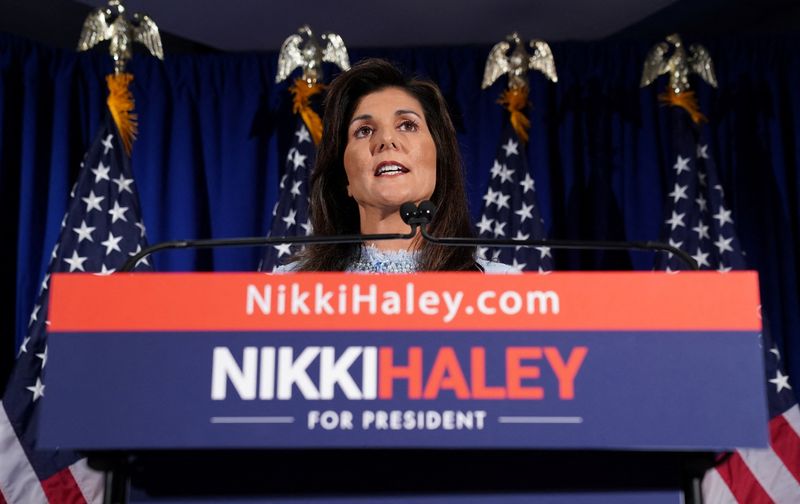By Gram Slattery
ARLINGTON, Virginia (Reuters) -Former South Carolina Governor Nikki Haley said on Tuesday she was personally against abortion rights but bore no ill will for those who felt differently, in a rare foray by a Republican White House hopeful into one of the more sensitive issues of the 2024 U.S. election campaign.
In a roughly 20-minute speech, Haley described the debate around abortion as an issue for each state to decide.
While she would favor legislation restricting abortion rights at the federal level, she said that as a practical matter Republicans were unlikely to win the majorities needed in Congress to impose their agenda.
For the time being, she said, all Americans would need to work to establish a consensus on the issue.
"I believe in conversation. I believe in empathy. I believe in compassion, not anger," said Haley, a former governor of South Carolina and the only female candidate in the Republican presidential race. "I don't judge someone who is pro-choice any more than I want them to judge me for being pro-life."
The issue is a thorny one for Republican candidates, and they have largely avoided talking about it in the early months of the 2024 campaign. When they have discussed it, they have struggled to commit to specific policies.
While a significant chunk of the party's base is fervently opposed to the procedure, most Americans, including many Republicans, think it should be legal in most situations. In a Reuters/Ipsos poll this month, 43% of Republicans said they were less likely to vote for a politician who supports limiting access to abortion.
Haley and her staff have often portrayed her as uniquely positioned to talk about abortion and other issues that affect women, given that all other candidates in the Republican field are men. During the speech, Haley spoke of personal experiences, including her own difficulty conceiving.
REPUBLICANS AT ODDS OVER ABORTION
Off the campaign trail, some Republicans are criticizing the party's handling of the issue.
Nancy Mace, a Republican in the U.S. House of Representatives from Haley's home state of South Carolina, said in an interview with ABC on Sunday that Republicans would "lose huge" if they kept pushing restrictive abortion policies.
Haley, who as governor signed a ban on abortions after 19 weeks of gestation, did not offer any new policy proposals and largely avoided specifics altogether.
She did not bring up the topic of abortion medication, which became a hot topic after a federal judge limited the distribution of abortion pill mifepristone in April, a decision that the Supreme Court put on hold.
Haley's comments were similar to those she made to a group of Republican women in Iowa earlier in April, when she called abortion a "personal decision" and urged Republicans to not "let this become a political football."
Abortion has become a more salient issue for voters since the U.S. Supreme Court last year overturned the 1973 Roe v. Wade decision, which had granted constitutional protections for the procedure.
Democrats campaigned aggressively on the Supreme Court decision in the 2022 midterm congressional elections, using it to galvanize voters and curb Republicans' hopes of winning both houses of Congress.
Among the other Republican presidential contenders, former President Donald Trump has been largely silent on abortion, though advisers have said he believes the matter should be resolved by the states.
Florida's Republican Governor Ron DeSantis, who has yet to declare his candidacy but is widely expected to, signed a law this month to ban most abortions in Florida after six weeks of gestation. But he did not publicly mention the law for nearly aweek.
Senator Tim Scott, a Republican who recently launched a presidential exploratory committee, has said he would sign a federal law to ban abortion after 20 weeks of gestation, but has declined to take a stand of abortion pills.

Democrats have shown no such reticence to jump into the public debate over abortion. President Joe Biden, a Democrat who on Tuesday announced he would seek a second term in 2024, favors abortion rights.
Vice President Kamala Harris was due to speak at a "rally for reproductive freedom" in Washington, D.C., on Tuesday evening.